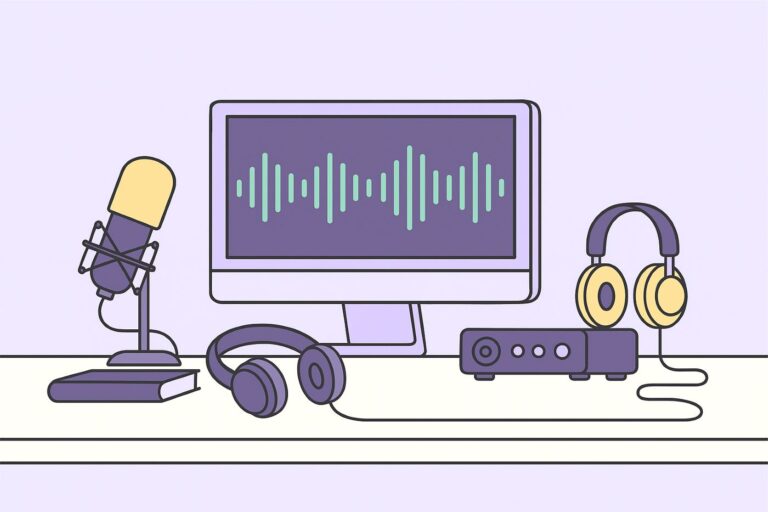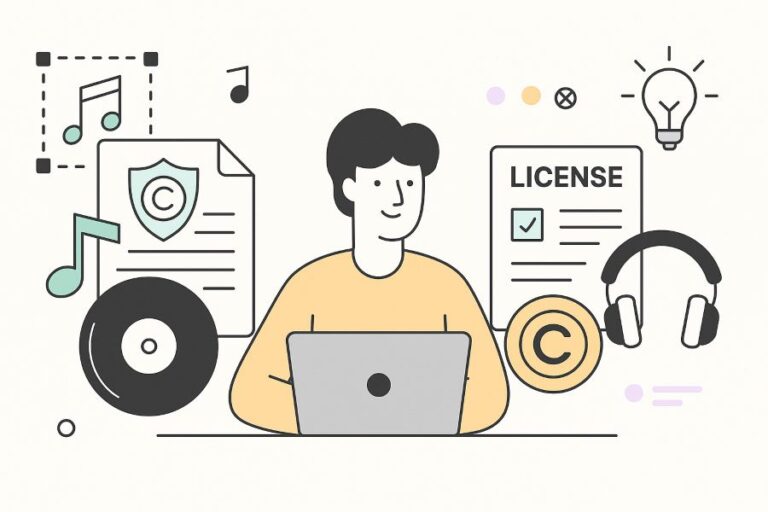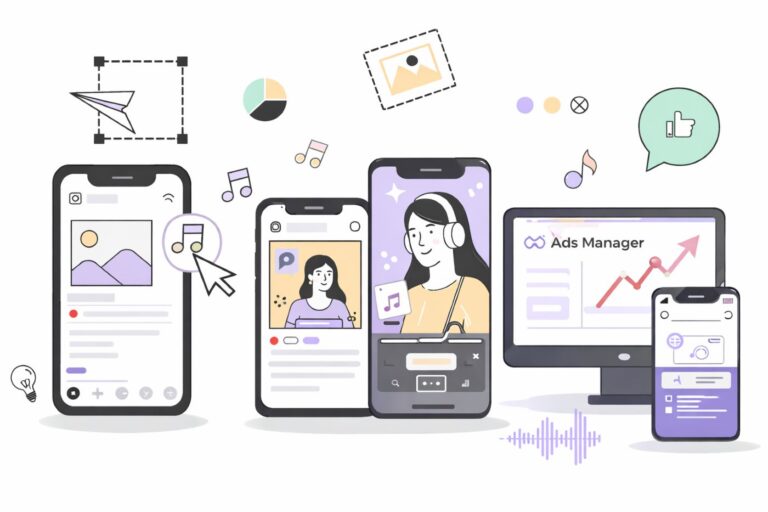Facebook Music Licensing FAQs
Audiodrome is a royalty-free music platform designed specifically for content creators who need affordable, high-quality background music for videos, podcasts, social media, and commercial projects. Unlike subscription-only services, Audiodrome offers both free tracks and simple one-time licensing with full commercial rights, including DMCA-safe use on YouTube, Instagram, and TikTok. All music is original, professionally produced, and PRO-free, ensuring zero copyright claims. It’s ideal for YouTubers, freelancers, marketers, and anyone looking for budget-friendly audio that’s safe to monetize.
Every week creators ask the same burning questions on Facebook: is this music really free, why did my Reel get muted, and can I still monetize with “royalty-free” tracks? This post gathers those answers clearly.
TL;DR
Are all tracks in Facebook’s music library copyright-free, and could I get a strike if I add the same song outside the FB editor?

Meta separates its music into two groups: commercial songs licensed for limited use and the royalty-free Meta Sound Collection.
Commercial music you see inside the Reels or Stories editor comes with restrictions. You can use it directly in those tools, but you don’t get a license to republish that track outside of Meta’s platform.
If you export the same video and post it elsewhere, or even re-edit it outside of Facebook’s editor, copyright detection can trigger. This may lead to muted audio, reduced visibility, or even demonetization of your content.
The safer option is the Meta Sound Collection. Music here is clearly marked as royalty-free and approved for monetized use on Facebook and Instagram. These tracks carry fewer restrictions and give creators much more security when publishing.
To protect yourself, always confirm that a track is labeled as royalty-free before you publish. Save the track name and screenshot its listing so you can prove your rights if Facebook mistakenly flags your video.
Can I still monetize if I use Facebook’s royalty-free music?

Yes, you can fully monetize videos and Reels when the soundtrack comes from Facebook’s royalty-free pool. This includes the Meta Sound Collection and Audio Library tracks that are specifically labeled as royalty-free for Facebook and Instagram use.
When you select music, always make sure the track is clearly marked as royalty-free rather than just “available” inside the editor. Availability does not mean monetization eligibility, and using the wrong pool of music can risk a claim.
Another important rule is to avoid tracks labeled with an “E” for explicit content. Even when these songs appear inside Meta’s music tools, they are not eligible for monetization and may cause your video to lose earnings.
Facebook has tied monetization eligibility directly to compliance with its royalty-free policy. That means the safest strategy for creators is to build a habit of sourcing from the Sound Collection and saving proof of the track’s listing before publishing.
If you rely on monetization, royalty-free music should be your default. It keeps your content compliant with Meta’s music guidelines, reduces the chance of muting or takedowns, and ensures that ad revenue flows to you instead of to rights holders.
On Facebook Reels, should I choose “royalty-free” or “music revenue sharing”?

Choose royalty-free music when you want predictable earnings and fewer problems. Sound Collection tracks qualify for full monetization, pass reviews cleanly, and rarely trigger claims, mutes, or revenue splits that cut your payout over time.
Pick Music Revenue Sharing only when you need a specific commercial track. If your video qualifies, Facebook shares ad revenue with rights holders, giving you twenty percent. Expect rules, country limits, and availability changes often.
Decide based on your goal. If you chase reach with a trending song, revenue sharing increases exposure but reduces earnings. If you prioritize income, royalty-free tracks deliver cleaner monetization, fewer surprises, and simpler dispute resolution.
Before banking on revenue sharing, check eligibility. The program applies to videos, countries, and songs, and Meta changes availability. If your video or track isn’t eligible, you won’t unlock sharing when the editor suggests it.
Use workflow. Default to royalty-free for Facebook Reels you plan to monetize. When a commercial track is essential, confirm eligibility, accept smaller earnings, and save proof. Run a copyright check and document your choices for disputes.
What is Facebook’s in-app music actually allowed to be used for?

Facebook offers two kinds of music. One is a library of licensed songs for in-app use. The other is Meta Sound Collection, a royalty-free pool for Facebook and Instagram. Knowing which pool you use matters.
Licensed commercial songs are meant for contexts in app. You can add them to Reels, Stories, or Facebook Live, but you shouldn’t export, remix, or reuse them elsewhere. Eligibility varies by account type, country, format, and campaign.
Meta Sound Collection is different. Those tracks are royalty-free for Facebook and Instagram, and they work for monetized Reels and videos. You can download them for editing, but permission still applies only on Meta’s platforms.
Ads, boosted posts, and branded campaigns demand care. Commercial songs usually don’t cover advertising. Business and creator accounts see limited access to pop music. For predictable results, use Sound Collection for ads, sponsorships, and workflows.
Rights and availability change. Run Copyright Check before publishing, and keep screenshots or links to track pages. If Facebook flags audio, replace it or appeal with proof. Avoid explicit tracks; they don’t qualify for monetization.
What music can I use on Facebook Reels without being demonetized – is there a specific FB collection to use?

Use Meta Sound Collection when you want monetized Reels. Those tracks carry a royalty-free label for Facebook and Instagram. They pass most checks, reduce flags, and deliver predictable earnings without sharing revenue with rights holders.
Open the track’s listing before you publish and confirm the “royalty-free” marker, not just availability inside the editor. Availability doesn’t equal monetization rights. Save a screenshot and the link so you can prove eligibility later.
Avoid commercial pop songs from the in-app library if monetization matters. Those tracks sit under separate licenses, vary by region or account type, and can push your Reel into revenue sharing or ineligibility for earnings.
Skip explicit tracks marked with an “E.” Facebook excludes explicit audio from monetization when it appears inside the composer. If you add one, your Reel can lose eligibility. Replace audio to restore earnings and visibility.
You can also import royalty-free music for Facebook videos that you licensed elsewhere. Keep the license file, receipt, and a note about permitted platforms. Run Copyright Check before posting. If a claim appears, dispute, and attach your documentation.
What music can we use on Reels that isn’t copyrighted?

Use Meta Sound Collection when you need non-copyrighted options for Reels. These tracks carry a royalty-free label for Facebook and Instagram, support monetization, and reduce claims. Confirm status, avoid explicit tracks, and save screenshot proof.
Your own original audio avoids copyright problems on Reels. Compose or record it yourself, and make sure you own the composition and the sound recording. Avoid unlicensed samples, clear loops, and get permission from collaborators.
Public domain can work, but verify sides. Many compositions are free, while recordings may carry copyright. Choose recordings marked public domain or CC0, document source, keep links and screenshots, and run Copyright Check before posting.
Will Facebook tell me if the music I’m about to use is copyright-free?

Facebook shows royalty-free status inside Meta Sound Collection. Open the track page and look for “royalty-free” label before adding it to your Reel. Not every in-app song qualifies, so confirm the label and save screenshots.
Use Copyright Check in Business Suite or the Reels composer to scan before publishing. It catches issues but doesn’t guarantee clearance. Rights can change, so keep licenses, receipts, and links to prove use in disputes.
Will my video be demonetized if I use Facebook editor music that isn’t labeled “royalty-free”?

Yes. If you use editor music without a “royalty-free” label, you risk losing monetization. Facebook treats commercial songs differently: they may route revenue to rights-holders or block earnings. Only true royalty-free tracks unlock full earnings.
Check track page before posting. Confirm the royalty-free label, avoid “E” tracks, and save screenshots. If a Reel uses commercial music, expect revenue sharing or ineligibility. Replace audio, rerun Copyright Check, and keep license documentation.
How can creators legally use music on Facebook Reels without infringing copyright?

Use Meta Sound Collection for legal use on Facebook and Instagram. These tracks carry a royalty-free label, support monetization, and reduce claims. Open the track page, confirm the label, and screenshot it to prove eligibility.
Create and use your own original audio. Write and record music you fully own, including composition and sound recording. Avoid unlicensed samples, clear loops, credit collaborators, and keep project files and receipts to document rights.
Public domain can work, but check both sides. Many compositions are free; recordings aren’t. Use recordings marked public domain or CC0, verify source properly, save screenshots and links, and run Copyright Check before publishing Reels.
How can I avoid copyright flags on Facebook Reels when the track is “royalty-free”?

Use Meta Sound Collection whenever possible for Reels you plan to monetize. Open the track page, confirm the “royalty-free” label, and avoid explicit tracks. This pool carries permissions on Facebook and Instagram and reduces claims.
If you import third-party royalty-free music, keep the receipt, license file, and license text. Make sure the license lists Facebook and Instagram, allows monetization, and names the track. Save copies in a folder for disputes.
Run Copyright Check before posting from Business Suite or Reels composer. It flags problems but does not guarantee clearance. Rights can change, so rerun checks after edits, and note the track ID for reference later.
If Facebook flags a Reel, follow the dispute or appeal steps and attach proof. Upload licenses, receipts, and screenshots. Replace audio if needed. Avoid explicit tracks, and keep project files organized so you can respond.
How do I show Facebook that my Reel uses licensed or free-to-use music?

Open Page Quality or Professional Dashboard and find the Reel with a claim. Select See Details, choose Dispute or Appeal. Explain your rights, reference the track name, and state you used royalty-free or licensed audio.
Attach proof that covers the use. Upload the license PDF or receipt, license text, or rights letter. Include the track link or ID, purchase email, order number, and platform permission explicitly stating Facebook and Instagram.
If Facebook removes the video or rejects your dispute, escalate. Use the Copyright Appeal form in Support Inbox. Reattach documents, add timestamps covering the music, and explain how your license grants monetized use on Reels.
Why did videos using Facebook’s “royalty-free” music suddenly become ineligible for monetization?

Some videos lose eligibility because the soundtrack wasn’t from Meta Sound Collection, even if it looked similar inside the editor. Only tracks labeled royalty-free qualify for full earnings. Check the track page and screenshot label.
Explicit content marks remove monetization. Tracks with an “E” label aren’t eligible, even when they appear in search results or suggestions. Swap to a royalty-free alternative, rerun Copyright Check, and keep screenshots showing track’s status.
Rights can change after you publish, flipping a Reel from eligible to limited or muted. If that happens, replace the soundtrack with a royalty-free option, or appeal using license documents, receipts, track links, and screenshots.
Why does Facebook give you music to add to your videos and then give you a strike for copyright infringement?

Facebook licenses songs for in-app use only. You can add them inside Reels, but the permission stays inside editor. Account type, country, and format rules limit what you may monetize, export, boost, or repurpose elsewhere.
Music rights shift. Labels change terms, territories, or owners, and Facebook Rights Manager detects matches on uploads. A track worked yesterday can trigger mutes or demonetization today. When that happens, replace audio or dispute using proof.
Why does music from Facebook’s own library sometimes trigger copyright issues?

Licenses for songs in Facebook’s library vary by country, account type, and format. You might add a track in Reels, but the license may exclude ads, boosts, or downloads, leading to limits, mutes, or monetization.
Audio fingerprinting can misidentify similar tracks, including remasters, covers, or updates. When metadata changes at labels or distributors, ownership claims may target your Reel, even with allowed music, and automated systems can impose temporary restrictions.
Rights often shift after publication as deals renew or catalogs move. A track cleared yesterday might lose coverage today. Facebook may apply mutes or limits. Replace the audio or dispute using licenses, receipts, and screenshots.
Why was my Reel demonetized even though I used music from Facebook’s non-royalty list, and how do I fix it?

You used music from Facebook’s non-royalty pool, which means the pop library. That library supports use, not monetization. The editor shows availability, not rights. Facebook may move Reels to revenue sharing or mark them ineligible.
To fix it, swap soundtrack to a royalty-free track from Meta Sound Collection and republish. If you licensed a commercial song, file a dispute. Attach license PDF, receipt, and track link, then rerun Copyright Check.
Why was my video “partially muted” for copyright when the track came from Facebook’s Audio Library (esp. after monetization)?

Labels update rights, territories, and deals after you post. Facebook’s detection can pull coverage, even on tracks from Audio Library. That change triggers mutes or monetization limits until you update audio or dispute using proof.
Fix it. Open the claim, choose Replace Audio or Dispute. Attach license file, receipt, track link, and a screenshot of the listing. Add timestamps covering the music, rerun Copyright Check, and republish once eligibility returns.
Where can I get music that is 100% allowed by Facebook?

Nothing is guaranteed, but the safest option lives inside Meta Sound Collection. Choose tracks labeled royalty-free, avoid explicit songs, open the track page, screenshot the label, save link, and run Copyright Check before you publish today.
For off-platform work, license music from reputable libraries. Make sure the license covers Facebook and Instagram, monetization, and downloads. Save receipts, license text, and track IDs. Store files so you can attach proof during disputes.
How do you find royalty-free music for Instagram Reels on a business account now?

Open Meta Sound Collection on desktop, search by mood or genre, and confirm track carries the royalty-free label. Download WAV or MP3, import into Reels, avoid explicit tracks, screenshot the listing, and run Copyright Check.
If your business account lacks the pop catalog, license royalty-free music from a library listing on Facebook and Instagram. Keep receipt, license text, and track URL. Store files, attach proof in disputes, and rerun Copyright Check.

Audiodrome was created by professionals with deep roots in video marketing, product launches, and music production. After years of dealing with confusing licenses, inconsistent music quality, and copyright issues, we set out to build a platform that creators could actually trust.
Every piece of content we publish is based on real-world experience, industry insights, and a commitment to helping creators make smart, confident decisions about music licensing.














